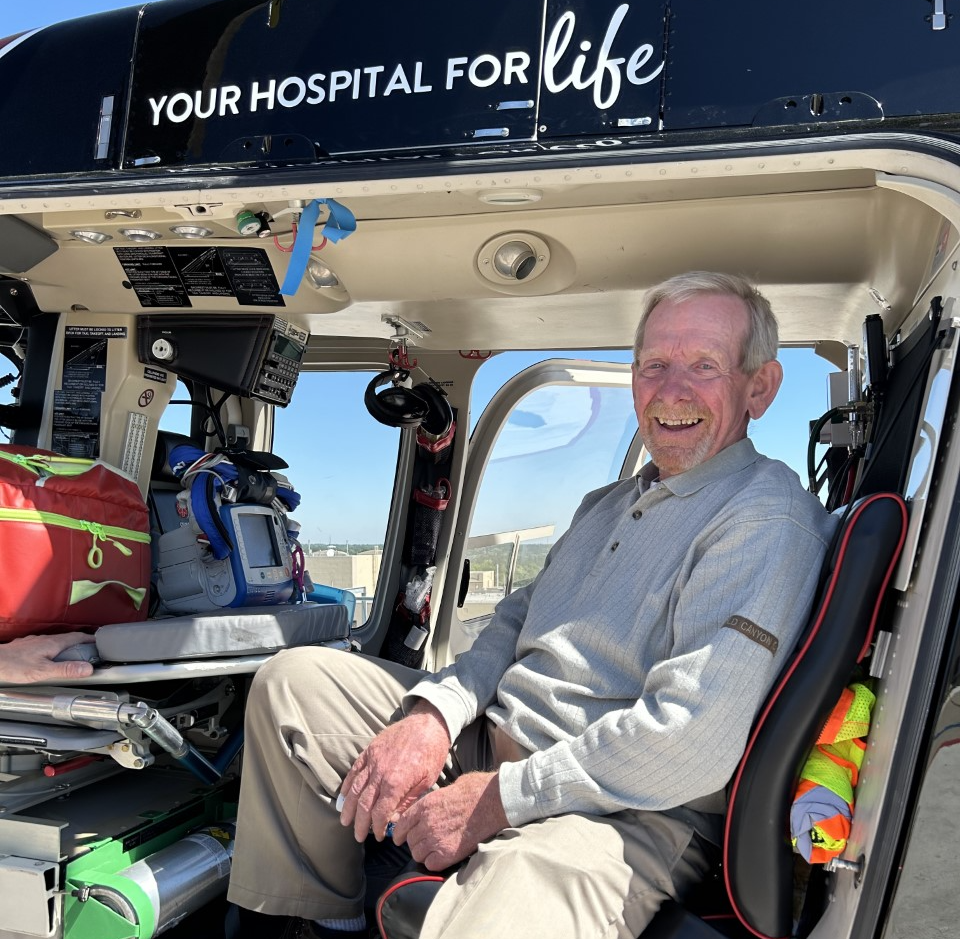Clifford Daugherty is Back on the Golf Course after Cardiac Arrest
Sunday, March 6, 2022, was shaping up to be a great day on the golf course in Madison County for Clifford Daugherty.
Clifford, 73, and his wife Kathy are snowbirds from Iowa. They spend part of their year in North Florida, living in their RV, enjoying the sunshine and golfing.
“I was told that Cliff had hit his best shot ever that day,” Kathy said. “His drive had gone the farthest it had ever gone.”
What looked like a phenomenal day of golf quickly changed for Clifford. He proceeded to hit three balls right into the water, and then he collapsed. Kathy was at their RV when she was told she needed to get to the eighth hole at Madison Golf & Country Club as quickly as possible.
She began driving her golf cart, frantically looking for her husband. She saw the ninth hole but couldn’t seem to find the eighth quick enough. She finally made it to Clifford and saw that he was in serious trouble.
Someone on the golf course immediately called 911 and when Madison County Emergency Services showed up and they began CPR. They rushed Clifford to Madison County Memorial Hospital, where the doctors realized he needed more advanced heart care and put him on a Survival Flight to Tallahassee Memorial HealthCare (TMH).
Clifford had experienced cardiac arrest, which occurs when the heart abruptly stops beating. More than 357,000 out-of-hospital cardiac arrests occur each year in the United States, and nearly 90 percent of them are fatal, according to the American Heart Association. Saving Clifford was a race against time.
While assessing Clifford the heart team at TMH discovered his coronary artery had a tight blockage. The heart team had to insert a stent in his blocked vessel to open it and restore blood flow to the heart. Clifford would also undergo implantation of an Impella® heart pump to support his weakened heart muscle.
The Impella® heart pump is a device that is temporarily placed into the ventricle of the heart for patients who are experiencing shock due to a heart attack. The pump supports the patient’s weakened heart by allowing it to rest while keeping blood flowing to the rest of the body. Once the heart is pumping properly, without assistance from the pump, the device is removed.
From the Survival Flight helicopter team, which is based at TMH, to the heart team that treated Clifford, an interdisciplinary team worked to coordinate his care and recovery.
“At TMH, we’re proud to be the leader in the southeast for heart care, offering our patients the most advanced and comprehensive care in the region,” said Andrew Starr, Vice President and Chief Health Operations Officer. “We offer our patients access to the most innovative treatment and technologies, like the Impella®, which in Mr. Clifford’s case, helped save his life.”
Although TMH’s heart team was a big part of Clifford’s journey to recovery, William Dixon, MD, Clifford’s cardiologist, said the people who got to him first on the golf course and started administering CPR are the true lifesavers.
“The people that saved his life were the people on the golf course,” said Dixon, an interventional cardiologist at TMH and Southern Medical Group, who serves as Medical Director for TMH’s Chest Pain Center. “They saved his life, and they saved his brain, and that’s the most important because you can get the heart back, but you can’t always get the brain back.”
As snowbirds, Clifford and his wife Kathy didn’t have family in the area. They relied on TMH’s heart team for support and comfort until their five children arrived from Iowa.
“Dr. Dixon will always have a place in our hearts, and that’s no pun intended, for his patience and kindness during Cliff’s ongoing treatment,” Kathy said.
Clifford doesn’t remember much of his experience, but he is grateful for the heart team for providing lifesaving care and giving him an Impella heart pump.
“I don’t remember anything; I don’t remember the week before much,” he said. “I don’t remember anything at the hospital. About the first thing I can recall is when we were driving away from the hospital. I don’t remember the check out. It’s gone.”
For the one-year anniversary of his cardiac arrest and recovery, Clifford reunited with some of the many people that helped him through his journey, from the Madison County emergency medical professionals and the flight crew to the nurses and doctors at TMH.
“To come back and see everyone and know what happened is just overwhelming for me,” he said. “You have no idea how it feels to be told you’re dying, and this crew brought me back. I can’t say thank you enough.”
Clifford was released after three weeks at TMH and was able to drive his RV back to Iowa and return to his five children and grandchildren. He is grateful for his life, grateful for the medical professionals who saved him and grateful to return to the life he enjoyed before his cardiac arrest.
“I have all of my faculties,” he said. “I remember everything — my kids’ phone numbers, and it’s like this didn’t happen a year ago.”
TMH performs more minimally invasive heart procedures than any other program in North Florida and South Georgia. To learn more about the advanced heart care offered at TMH, visit TMH.ORG/Heart.

